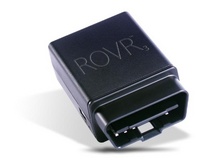TransCore Debuts GPS-Based Device for Infrastructure-less Tolling and Safe Driving Applications
 |
ORLANDO--TransCore introduces ROVR, a GPS device with GSM communications that allows infrastructure-less tolling and includes an optional driver safety monitoring feature shown to dramatically reduce accidents, improve fuel economy, and decrease Greenhouse gases (GHG). The device will be showcased in booth # 1949 and demonstrated in both the outside safety and pricing pavilions.
“The way each individual drives affects safety, fuel economy of cars and the impact vehicles have on the environment”
As forms of tolling or road user charging become a more viable means to fund transportation infrastructure, the infrastructure-less tolling capability eliminates the need for costly toll structures and can be quickly implemented on new or existing roadways. ROVR is ideal for HOT lanes or Greenfield tolling environments both domestically and internationally. The ROVR device can also easily facilitate mileage-based user fee data if such legislation is approved.
The driver scorecard option is ideal for commercial vehicle fleets, parents of teen drivers, department of motor vehicles (DMVs), or driver education schools that need performance data or asset location devices. While most people believe they are above-average drivers, objective data can help improve driving patterns. As an educational tool, the scorecard increases awareness about how driving behavior can lower fuel costs, increase safety, and reduce individual carbon footprints.
The compact device plugs into the OBD port located under the dashboard, near the steering column on every car built since 1996. Installation takes only seconds to complete.
TransCore's Chief Technology Officer Kelly Gravelle explains, "What I find exciting about ROVR is its different approach from conventional technical implementations that are infrastructure intensive.
"ROVR gives transportation agencies an option they didn't have before. The multi-application nature of ROVR can not only deliver congestion management benefits much sooner than conventional approaches but provides a critical tool to help save lives and reduce green house gases. It is a compelling concept that could be a game changer for some agencies and at no cost to them."
Infrastructure-less Toll Facility
TransCore developed sophisticated, new algorithms designed to deliver high accuracy while using minimum bandwidth for both infrastructure-less toll plazas and HOT lane systems. Side-by-side test results at highway speeds using a ROVR device showed identical transactional performance to conventional transponder- based systems.
This new approach to HOT lane implementation can be deployed in just weeks or months and at zero or little to no cost to the transportation agency. Such an "Instant HOT" lane can be deployed across entire regional networks thereby increasing the potential for revenue generation and other benefits several fold. TransCore's design approach to such an infrastructure-less HOT lane system is based on a cost- effective telematics hardware platform, taking advantage of explosive improvements in telematics technology.
Driver Scorecard
For commercial fleets, ROVR can provide automated vehicle and driver monitoring. For new teen drivers, ROVR instructs and promotes safe driving habits, minimizing potential vehicle incidents.
"The way each individual drives affects safety, fuel economy of cars and the impact vehicles have on the environment," said Gravelle. "Unfortunately, we all think we are great drivers. We receive little feedback unless we have an accident or are stopped by a police officer."
Measuring certain driving characteristics like excessive idling, hard braking, rapid acceleration or over speed has shown to effectively quantify driver performance and risk. In research studies, providing this type of feedback to drivers has shown to improve driver performance. The way each motorist drives affects motorists' safety, the fuel economy of cars, and the impact vehicles have on the environment.
- Each week, a scorecard is emailed to the driver. No need to login to a website.
- The scorecard highlights important aspects of the motorist's driving behavior compared to others and to the previous four weeks.
- The scorecard is designed to be easy to understand and provides useful insights into changes the motorist may want to consider that will save money or ensure safety.
- No vehicle tracking data is exposed, eliminating the "big brother" concerns. Focus is on safety and fuel economy.
Study Results: During a 2010 EnCana study to monitor a fleet of vehicles used in the oil and gas industry, driver report card participants reduced rapid starts by 40 percent, speeding was 45 percent lower than the EnCana average, and most compelling the study saw a 49 percent reduction in motor vehicle incidents.
About TransCore
TransCore's 75-year heritage supporting the global transportation industry spans the implementation of the United States first electronic toll collection system to the development of RFID technology at Los Alamos National Labs. With experience in more than 50 countries, more than 100 patents and pioneering applications of RFID, GPS and satellite communications technologies, TransCore's technical expertise is unparalleled in the markets it serves. In 2011, Engineering News-Record (ENR) ranked TransCore No. 154 out of the Top 500 Design Firms.
TransCore's extensive global experience with tolling systems includes more than 7,400 installed electronic toll collection lanes worldwide and 27 customer service centers. TransCore offers an extensive suite of enterprise software applications, business process outsourcing, system integration, customer care and maintenance services to provide complete solutions, configurable to customers' requirements.


